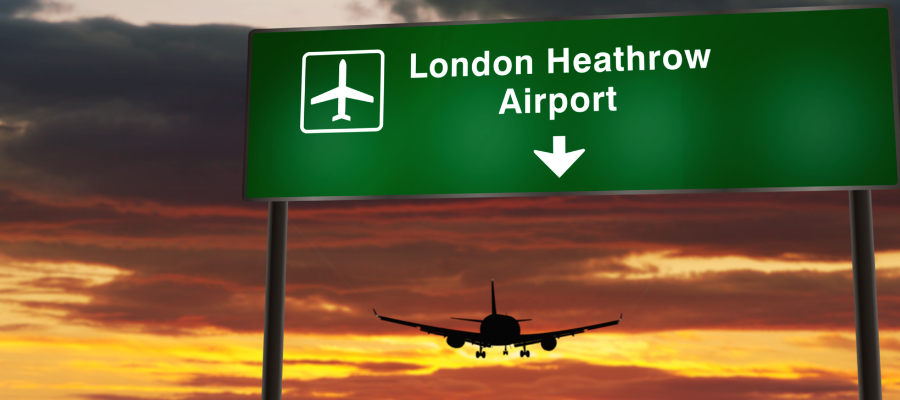🕒 Article read time: 2 minutes
Heathrow Airport – the sky is the limit

The cost-of-living crisis, post-pandemic supply chain issues, the conflict in Ukraine and soaring energy prices have led to a drop in freight movements across all modes since 2021.
Overall, consumer activity is down and compared to last year, retail sales have fallen 6.9%. Aviation saw a particularly steep decline in passenger traffic during the pandemic. The Department for Transport’s (DfT) Future of Freight plan showed passenger volumes dropped by 75%, while air cargo only saw a 21% reduction.
TRANSPORTING HIGH-VALUE FREIGHT
While it represents only 1% of goods by volume, pre-pandemic, air freight represented 40% of goods by value. This significant figure shows the vital role air freight plays as an enabler of trade for the UK.
Heathrow Airport is established as the most valuable of all the ports within Great Britain and handled three quarters of all UK air cargo in 2021. By value this is higher than all other Great British airports combined. However, despite passenger traffic collapsing in 2021, Heathrow remained the UK’s lifeline by maintaining strong cargo throughput, transporting 1.4m tonnes, including vital supplies such as PPE, medical equipment and pharmaceuticals including vaccinations. Heathrow Airport is now looking to invest in infrastructure over the next five years to grow capacity and the sustainability and efficiency of its operation.
THE CASE FOR ADDITIONAL AIR FREIGHT CAPACITY
In July 2015, the independent Airports Commission reported the conclusions of its three-year study examining the need for additional capacity to maintain the UK’s position as Europe’s most important aviation hub. With overall UK air freight volumes 8% lower in 2021 than in 2019, the expansion of Heathrow with a third runway has the potential to significantly grow air freight capacity. Heathrow Airport is the only hub airport within the UK and the only airport which accepts both European and international cargo freight. It currently serves more than 200 destinations in more than 80 countries, therefore connecting the UK to the rest of the world.
A QUIET REVOLUTION
The expansion of Heathrow does come with its own challenges as local communities are opposed to the third runway due to further noise disruption. Night flight restrictions are already in place which ensure that Heathrow Airport does not schedule departures between 22:50 - 06:00, or schedule arrivals between 22:55 - 04:40. Logistics UK does not support any further restrictions on night flying, as this would curtail the ability for both inbound and out bound cargo, as the peak arrival time for inbound express freight is during the night period between 06:00 – 06:59. It is important to remember that as technology improves, quieter more sustainable aircraft will continue to replace older models, which will reduce the amount of noise within communities.
PLANNING TO DECARBONISE
Since the expansion was approved in 2018, the UK has committed to net zero emissions by 2050 and on 4 December 2020 it pledged to cut carbon emissions by 68%, from what they were in 1990, by 2030. In October, the then Prime Minister Liz Truss and Transport Secretary Ann-Marie Trevelyan expressed support, however it remains unclear whether Prime Minister Rishi Sunak will support the plans. As a result of the Supreme Court overturning a previous judgement, the airport can now seek a development consent order (DCO), a type of planning permission for nationally significant infrastructure. This may be difficult, as it will take into consideration stricter pledges to cut emissions made recently by the UK government.
EXPANSION PROMISES TO CREATE OPPORTUNITIES
The £14bn third runway expansion could see Heathrow operate an additional 260,000 flights annually. A clear example of the opportunities additional runways create for freight is Charles de Gaulle Airport in Paris. With five runways, approximately 90% of French air freight by volume is transported through the airport, which has the capacity to handle around 2.6 million tonnes of freight per year. With the net zero deadline set for 2050, it will be crucial that any expansion meets environmental and sustainability targets.
Alexandra Herdman, Senior Policy Manager, Logistics UK, said: “Passenger flights continue to hold priority over freight in slot allocation, despite freight keeping the sector moving and retaining jobs during the pandemic. Logistics UK remains clear that freighters must not be side-lined to passenger flights when slot availability is reviewed. There must be a transparent system providing fair access for freight services, ensuring continued capacity for cargo.”
*www.logistics.org.uk/air
Published On: 08/12/2022 16:00:31

Comments Section
If you are a Logistics UK member login to add comments.